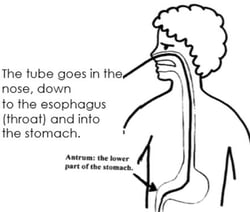Your child has been scheduled for an Antro-duodenal Motility Study for (date) _____________ at _________ a.m. in the
- Day Surgery department at Children’s Hospital of Wisconsin.
- Inpatient admitting.
Please stop at a Welcome desk for a badge and directions to Day Surgery.
Please be here by _________a.m. to register.
What does gastrointestinal (GI) motility mean?
Motility means how something moves. The food your child eats moves from their mouth through the GI system which is about 30 feet long! It is often called the digestive system. The nerves and muscles must work together for the food to move. Gastrointestinal motility is how well food moves through the digestive system.
What is antro-duodenal motility?
The antrum is the last part of the stomach before it empties into the small intestine. The duodenum is the first part of the small intestine.
This study measures how the muscles of the stomach and duodenum contract (get tighter).
What needs to be done before the test?
1. Your child cannot eat or drink any solids or dairy products after midnight the night before the test. Clear liquids are okay up to 2 hours before the test. This includes water, apple juice, Pedialyte®, white grape juice, and Popsicles® (no red or purple).
It is important that you follow these special instructions. If your child eats or drinks anything after the time you are told, the study may be cancelled.
2. A nurse from Day Surgery will call you 1 to 3 days before the test to:
- Check the current health of your child. Your child should not have a fever, cold, or other illness.
- Remind you what time your child must stop eating and drinking.
- Tell you what time to come to the hospital. Please remember that the scheduled test time is an estimate. The schedule can change at any time.
3. If your child has diabetes or other health problems, please contact your doctor or clinic about the procedure as soon as it is scheduled.
How is the study done?
Your child will go to a special room to have the catheter put in. Family members are not allowed to be in the room while the catheter is being placed. However, you will be able to stay with your child during the study.
- Your child may will be given medicine to help them sleep or relax (anesthesia). An IV will be started.
- A soft, flexible tube called a motility catheter will be used. It is about the size of a thick straw. It goes into your child’s nose, down the throat and into the stomach and duodenum. This tube will not make it hard for your child to breath. If your child has a G-tube, the catheter will be passed through the G-tube instead of the nose. The motility catheter has several smaller tubes inside it with holes that measure pressure.
- The catheter is taped to your child’s cheek, nose or stomach. If your child is sensitive to any kind of tape, talk to the doctor or nurse before the test.
- Your child will be taken to the recovery room until fully awake. Then your child will be moved to the motility room or a hospital room. The sleep medicine needs to wear off for the test to be correct. Pain or nausea medicines cannot be given because they may affect the test results. The motility catheter will be connected to a computer. This is the start of the study. The study takes about 5 to 6 hours.
- The first two hours, we watch the motility pattern while your child rests. Then 1 or 2 medicines are given through the IV every hour. We watch to see what kind of a pattern change they cause.
- Next, your child will be given a high-fat meal that must be eaten in about 30 minutes. Your child will have choices about the foods they will eat. Let the motility nurses know if your child has any food allergies or intolerances. Please bring any special bottles or special formula your child uses.
- We will watch the motility pattern for another hour, and then an x-ray may be taken to check the catheter position.
- The tube is removed. Your child can then go home.
Will this test hurt?
Your child may have some discomfort from having the tube in their nose or from having it taped to their cheek or nose. Having a tube in their nose may be a new experience, but most children get used to it.
What else do I need to know?
Your child will need to stay in bed during the entire study; you may bring movies, toys, books or quiet games to help keep your child from getting bored and restless.
At least one parent should stay with your child during the test. For safety reasons, we ask that you do not bring other children. Grandparents or one or two other adults are welcome.
Some medicines that your child is taking may need to be stopped up to 14 days before the study.
Note: If you have not gotten a call from a motility nurse 7 days before your child’s scheduled study please call (414) 266-8490 (M-F between 8-4PM)
When will I know the results?
Early results may be discussed with you after the test is done. It may take about a week for the doctors to review the test recordings and have final results. A letter will be sent to the doctor who ordered the test. You will be called if the final results differ from the early results.




